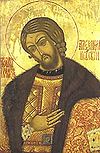- Mikhail Tereshchenko
-
Mikhail Tereshchenko
Михаил Терещенко
Finance Minister of Russian Provisional Government In office
17 March 1917 – 4 May 1917Foreign Minister of Russia In office
5 May 1917 – 26 October 1917Preceded by Pavel Milyukov Personal details Born 18 March 1886
Kiev, Russian empire (now Ukraine)Died 1 April 1956 (aged 70)
MonacoSpouse(s) Margaret Noe (?-1923)
Horst (1926-?)Children a daughter
a daughter
Petr Tereshchenko (1917-?)[1]Mikhail Ivanovich Tereshchenko (Russian: Михаил Иванович Терещенко; Ukrainian: Михайло Іванович Терещенко) (18 March 1886, Kiev – 1 April 1956, Monaco) was the foreign minister of Russia from 5 May 1917 to 25 October 1917. He was also a major Ukrainian landowner, owner of several sugar factories, and financier.
Contents
Biography
Born to a rich Tereshchenko family of a sugar factory owners, entrepreneurs, philanthropists, and art patrons of Ivan Nikolayevich (1854–1903) and Yelizaveta Mikhailovna. Mikhail had a younger brother Mykola (1894-?). His uncle Aleksandr Tereshchenko (1856–1911) worked in Saint-Petersburg. Mikhail Tereshchenko graduated from Kiev University and Leipzig University. In 1910, he joined the Freemasonry and became one of the five prominent Masons in Russia (the other four being Alexander Konovalov, Alexander Kerensky, Nikolai Nekrasov, and Ivan Yefremov). Mikhail Tereshchenko was a member of the Fourth State Duma (he never belonged to any party, but shared the views of the Russian Progressive Party). In 1912–1914, Tereshchenko was the owner of a private publishing house Sirin in St Petersburg. During the World War I, he took part in organizing the Red Cross hospitals. In 1915–1917, Mikhail Tereshchenko was the chairman of the Military Industry Committee of the Kiev district and deputy chairman of the All-Russian Military Industry Committee. Also, he participated in preparing a conspiracy with the purpose of deposing Nikolai II. After the February Revolution of 1917, Mikhail Tereshchenko was appointed Minister of Finance of the Provisional Government. In April 1917, Tereshchenko (together with Kerensky and Nekrasov) was actively seeking to create a governmental interparty coalition with the Socialists. On 5 May 1917, he was appointed minister of foreign affairs after the resignation of Pavel Milyukov. Tereshchenko continued his foreign policy course, which led to his conflict with Minister of War Alexander Verkhovsky, who had considered Russia to be unable to continue the war. He was a member of the Directory in 1917. Tereshchenko was known to support the Ukrainian government that led to the establishment and recognition of the General Secretariat in Ukraine 1917.
On the night of 26 October, Mikhail Tereshchenko was arrested in the Winter Palace with other ministers of the Provisional Government and placed into the Peter and Paul Fortress. In the spring of 1918, he escaped from prison and fled to Norway and then France. Tereshchenko was one of the supporters of the White Movement and allied intervention in Soviet Russia. In 1920s and 1930s, he was engaged in financial activities in France and Madagascar.
Memberships
- Freemason Halpern's Lodge
- the All-Russian Association of Sugar factories
- Volga-Kama Bank
- Kiev department of the Azov-Don Bank
References
External links
- Михаил Иванович Терещенко at Вашъ Кіевъ (Your Kiev) project. (Russian)
- Терещенко дал деньги на киевскую консерваторию. 120 лет назад родился бизнесмен и меценат Михаил Терещенко, Газета по-украински, 24.3.06,
Political offices Preceded by
Pavel MiliukovForeign Minister of Russia
5 May 1917 – 26 October 1917Succeeded by
Leon TrotskyPeople from Russia Leaders and religious - Pre-1168
- 1168–1917
- 1922–1991
- 1991–present
- RSFSR leaders
- General secretaries
- Soviet premiers (1st deputies)
- Soviet heads of state (and their spouses)
- Prime ministers (1st deputies)
- Foreign ministers
- Prosecutors general
- Metropolitans and patriarchs
- Saints

Military and explorers - Field marshals
- Soviet marshals
- Admirals
- Aviators
- Cosmonauts
Scientists and inventors - Aerospace engineers
- Astronomers and astrophysicists
- Biologists
- Chemists
- Earth scientists
- Electrical engineers
- IT developers
- Linguists and philologists
- Mathematicians
- Naval engineers
- Physicians and psychologists
- Physicists
- Weaponry makers
Artists and writers Sportspeople - Chess players
Categories:- 1886 births
- 1956 deaths
- People from Kiev
- Foreign Ministers of Russia
- Freemasonry in Russia
- Imperial Russian politicians
- Ministers of the Russian Provisional Government
- Members of the State Duma of the Russian Empire
- Russian people of Ukrainian descent
Wikimedia Foundation. 2010.
